Queens Market
Keith Parkins | 11.04.2005 17:16 | Culture | Health | Social Struggles | London
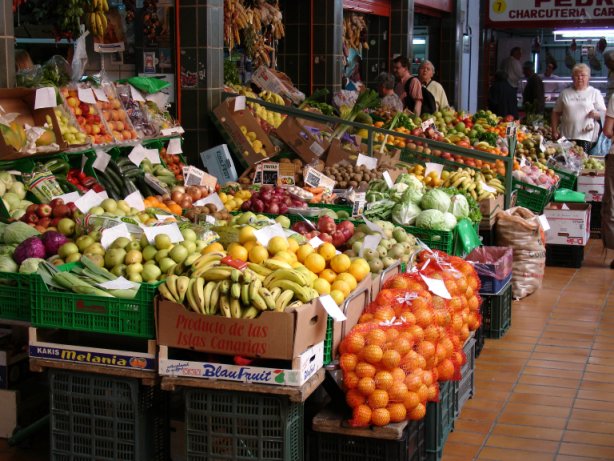
mercado de fruitas y veduras en Tenerife
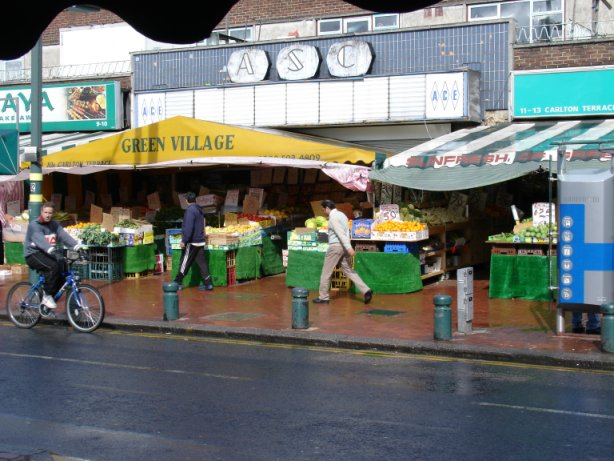
fruit and vegetable shop at Upton Park
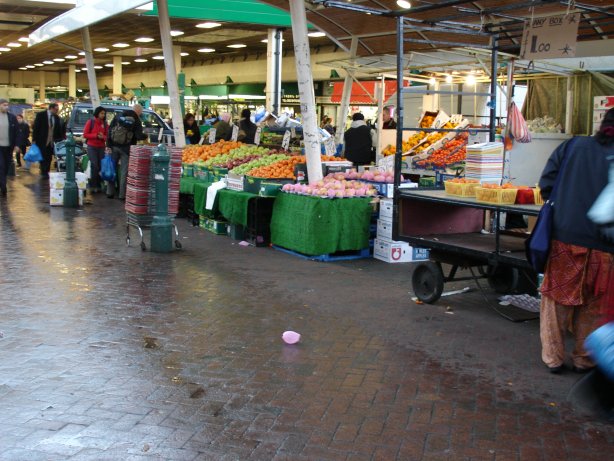
Queens Market at Upton Park
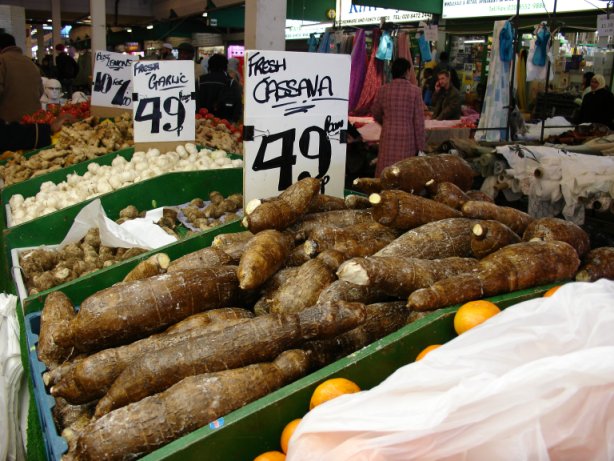
fruit and vegetable stalls in Queens Market
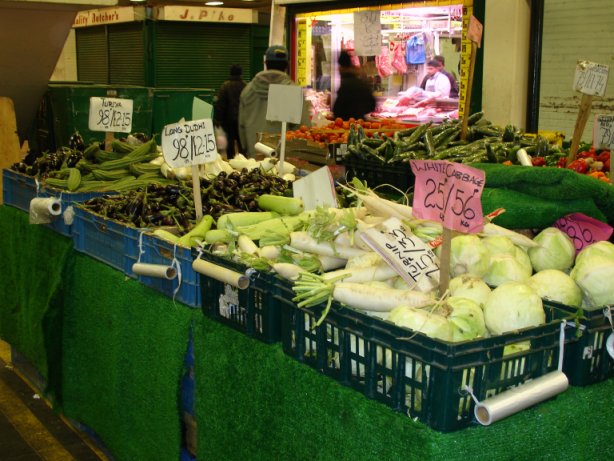
fruit and vegetable stalls in Queens Market
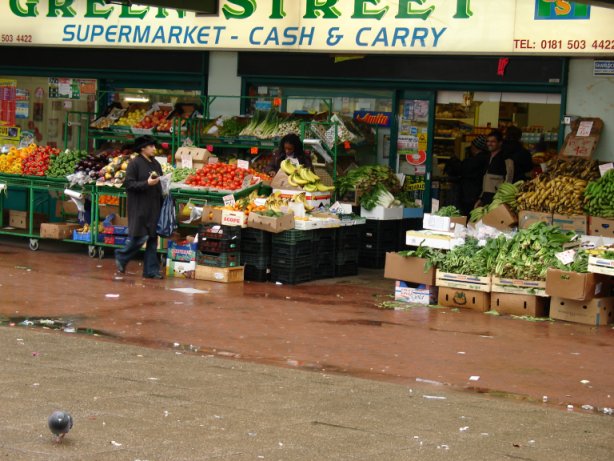
local supermarket outside Queens Market
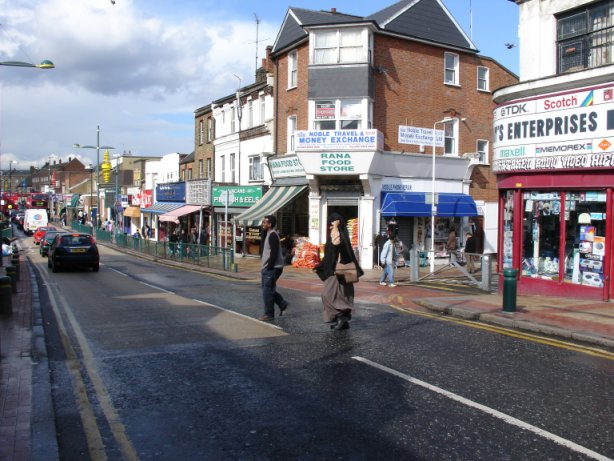
local roads can cope with traffic from a superstore
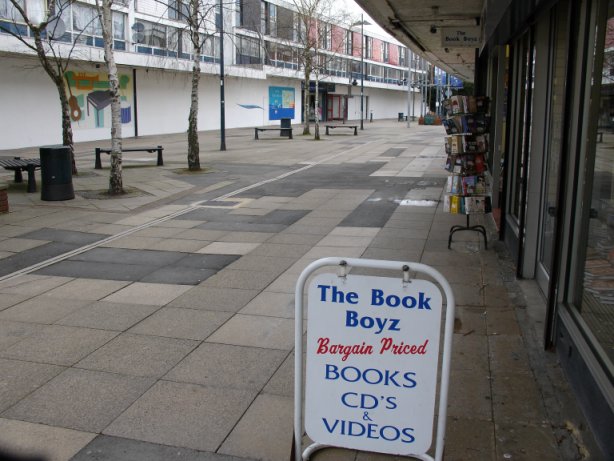
boarded-up shops Farnborough town centre on a busy Friday afternoon
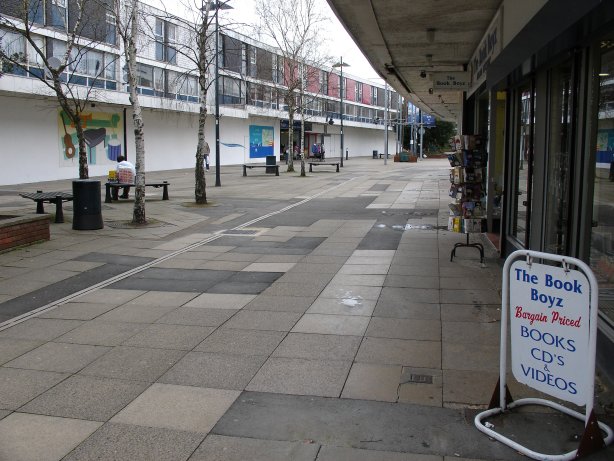
trashed by St Modwens Farnborough town centre on a busy Saturday afternoon
'Supermarket development compromises the economic viability of small independent retailers, increases traffic and destroys the social role that small shops provide in bringing together communities and fostering trust about the products supplied.' -- Corporate Watch
'When we look more closely at the hidden costs of supermarkets, the choice, convenience and value they supposedly offer becomes questionable. By putting small independent retailers out of business, they are hardly providing choice. By forcing consumers to use their cars for their weekly shop, they are hardly convenient, and when we calculate the cost to the taxpayer, small farmers, our health and the environment of 'cheap food', it doesn't seem such good value.' -- Corporate Watch
'Our research has shown that large foodstores can and have had an adverse impact on market towns and district centres ... The level and consequence of impact will vary depending on the particular local circumstances ... Smaller centres which are dependent to a large extent on convenience retailing to underpin their function are most vulnerable to the effects of large foodstore development in edge-of-centre and out-of-centre locations.' -- DETR
'A superstore is a neutron bomb. It wipes out commercial life for streets around, while its parking spaces jam the traffic ...' -- Simon Jenkins
'The supermarket industry is a cut-throat business where companies try to kill each other off.' -- Sir Archie Norman, former boss of Asda
'It's not good enough. We have got only 5% of the non-food market. We have 18% of the grocery market and there's 90% of the non-food market to go for. And we are up against overpriced high street stores. There's a lot left to go for.' -- David Reid, deputy chairman of Tesco
Wonder down any High Street and you are in Anytown, they all look the same, Next, Gap the sweatshop shop, Starbucks serving crap coffee. Clone town.
And these are the 'good' towns, that haven't yet died. A good example is Guildford, although to be fair to Guildford, there is a good range of independent shops, although having said that, even these are slowly dying, Guildford has lost two good books shops, an outdoor shop, a baker, all within the last few years.
 http://www.heureka.clara.net/surrey-hants/gu-ford.htm
http://www.heureka.clara.net/surrey-hants/gu-ford.htm Then there are the dead and dying towns. Charity shops, junk food outlets, pound shops and little else but boarded-up shop fronts and yobs hanging around. Farnborough and Aldershot are good examples, both of which have been killed off by bad development, councillors and their officials colluding with developers against the best interests of the local community and local traders and shopkeepers.
 http://www.heureka.clara.net/surrey-hants/ald-shot.htm
http://www.heureka.clara.net/surrey-hants/ald-shot.htm  http://www.heureka.clara.net/surrey-hants/farnboro.htm
http://www.heureka.clara.net/surrey-hants/farnboro.htm Then there are the trolley towns. A network of ring roads, roundabouts and stores in gigantic sheds. No longer are the entrances to a town guarded by walls and a castle and a moat and a gatekeeper. Today's sentries on each approach road are the palaces of greed, the retail emporiums of Asda*Wal-Mart, Tesco, Sainsbury's, Morrisons.
Then there is Upton Park!
Alight at Upton Park tube station (on the District Line) and wonder down the High Street. It is like no other. No Starbucks serving shit coffee, no Gap the sweatshop shop, no Next.
Upton Park High Street, actually Green Street, has no High Street names, okay, there is a Tesco and Iceland and a couple of others, but the overwhelming majority are small and not so small independent traders selling an amazing range of different goods.
Few High Streets these days, few town centres even, have a greengrocer left. Farnham is one of the exceptions in that it still retains an excellent family greengrocer, plus a couple of butchers.
 http://www.heureka.clara.net/surrey-hants/farnham.htm
http://www.heureka.clara.net/surrey-hants/farnham.htm Upton Park has at least half a dozen greengrocers, and a couple of these are large, the size of a small supermarket. There are then little supermarkets, with boxes of fresh fruit and vegetables outside.
It is usual to see this on the continent, small shops with a range of goods, including fresh fruit and vegetables, but rare these days in England. So rare, that they have become an endangered species.
An Internet café, that also doubled as a mobile phone shop, a nail bar and a shoe shop. A dress shop, that was also a CD and DVD shop. Stalls openly selling pirate CDs and DVDs. Excellent restaurants.
Then there is Queens Market, a street market, now under cover, established a century ago.
Initial impressions of Queens Market is one of 'what a dump', dingy and dark, rubbish everywhere, senses assaulted by a variety of smells, some pleasant, some not so.
I expected something like the Central Market in Lincoln, or the Old Market in Hove (no longer used as a market).
Initial impressions can be misleading. A better description of Queens Market would be a Middle East bazaar, an Arab souk. And just as interesting.
Household goods, little cafés, several butchers, and lots more fruit and vegetable stalls.
Stalls selling, as the fruit and vegetable shops in the street outside, a far wider variety of fruit and vegetables than one would usually see. On some stalls, half the produce, I had never seen before.
And prices.
Tomatoes starting at 10p/pound, and they were not mangy either. Some of the slightly dearer ones had seen better days, but perfectly okay for cooking, making soup. Which is what fruit and vegetable markets should be all about, a variety of prices and quality for different culinary purposes. Not one size fits all EU standardised size, accurate to within a millimetre.
Dark green unripe bananas. The first time I had seen bananas on sale like this outside of markets in Tenerife.
A box of mandarins, or were they satsumas, for a pound. Two melons for a pound. Three cauliflowers for a pound. Two large mangoes for a pound. And so I could go on.
Butchers chopping up meat in most unsavory conditions outside, then chucking into carrier bags.
Yes, the market is dingy and dirty. But who is to blame?
Surely the piss-poor management by the council.
I saw cleaners, half a dozen or more, hanging around doing nothing. They sprang into action at the end of the day. Well to say 'sprang' is a slight exaggeration.
I asked them why there was all this rubbish lying around. We are cleaning it up they said. True, but why leave it lying around all day. It's the fault of the stall holders for generating rubbish was the pathetic reply.
A further example of the piss-poor management is that the Council pays a private contractor (a mate of the Mayor?) £40,000 a year to collect the stall fees in cash. Have not Newham Council heard of banks, payment by cheque, direct transfer?
What Queens Market needs, apart from decent management, is a major refurbishment. Demolition of the covering structure and replacement with a modern lattice open structure that would let the light in. High power mercury lamps that could be used on dark winter days. The market would then be open and airy and well lit.
The market only opens Tuesday, Thursday and Saturday. The space is not used on the other days. What a waste, and another example of a piss-poor performing council.
Could it not be used for community events, an open forum for meetings, car boot sales, a farmers market?
Implement these ideas and Upton Park would not only have a vital local asset, if marketed properly, it could be, sited as it is adjacent to Upton Park tube station, a major tourist attraction. It would then bring much needed revenue into a deprived area. The money would pass into the hands of local traders and be recycled within the local economy.
But to implement these ideas requires intelligence, management expertise, imagination, qualities that are usually lacking in local councillors and their officials. And certainly lacking in Newham Council.
Newham Council's future for Queens Market is destruction, cunningly described as 'redevelopment', sell the site to St Modwens, and build a superstore, with luxury flats atop. And maybe a few retail units so we can attract, guess what, High Street names.
Upton Park can then be a me-too anytown, same as any other clone town across the country. Assuming of course that anything survives at all after being given the kiss of death by St Modwens.
St Modwens have a well-deserved reputation for destroying town centres, wreaking havoc on local retailers and local communities.
St Modwens, through KPI (Key Property Investments, a Kuwaiti-financed front company) bought Farnborough town centre several years ago. They have erected a couple of eyesores, which are so shoddily built that they make the 1960s town centre look like quality build. They wish to demolish half the town centre and build a superstore. St Modwens say it is Sainsbury's, the councillors who repeat whatever crap St Modwens feed them, say it is Sainsbury's, Sainsbury's deny it is anything to do with them. This in an area saturated with superstores, within 100 metres of an existing Asda superstore. Social housing will be destroyed to make way for a car park for the superstore.
Local people, who have not been consulted, say that what we want is a range of decent shops, especially local independent shops, as are still found in not far way Farnham. What we don't want, they say, is yet another superstore.
In the meantime, what was once a thriving town centre is in its final death throes. With the collusion of local councillors, St Modwens has well and truly trashed the town. Retailers who have been in business for 20-30 years, have been driven out of town, or out of business; a florist takes a total of £5 in a single day; an estate agent sees no clients all day long, it is almost a red letter day when he sees people walk by the door, at least there is always the hope they may not jut walk by, but actually walk in, if only to help pass the time of day.
As Peter Newman, a local retailer, wrote of Farnborough town centre a couple of years ago:
'In 1996 there were five empty units in Queensmead [main street running through the town centre], right now there are five left. Is that progress? The whole plan is totally unrealistic. After four years and the destruction of the town centre, all there is to show for it is the loss of over 70 businesses.'
Things have got much worse since Peter Newman wrote these words. His shop, Fingz Fashion, is no longer trading in the town centre, they have joined the steady exodus of retailers leaving Farnborough. Retailers, who, like the local community, have no confidence in the KPI plans, no confidence in the council to act in the best interests of the local community. And what have the local councillors done? They have sat idly by and wrung their hands or looked around to scapegoat anyone other than themselves. They have lashed out at members of the community, that is people (the only people) who have been doing their best to safeguard the town.
As I write, yet more shops are closing their doors for the last time. People who have not visited Farnborough for a few years are shocked by what they find.
 http://www.google.co.uk/search?hl=en&q=Farnborough+town+centre+site%3Awww.indymedia.org.uk&meta=
http://www.google.co.uk/search?hl=en&q=Farnborough+town+centre+site%3Awww.indymedia.org.uk&meta=  http://www.heureka.clara.net/surrey-hants/kpi-october2004.htm
http://www.heureka.clara.net/surrey-hants/kpi-october2004.htm Outside Swindon, St Modwens wanted to build on a community forest that has only recently been established. The good news is that the local community sent St Modwens packing with their tale between their legs.
 http://www.indymedia.org.uk/en/2004/07/295296.html
http://www.indymedia.org.uk/en/2004/07/295296.html Even in Farnborough, St Modwens have not had it all their own way. Objectors have challenged them every step of the way. Two successful Judicial Reviews have forced planning consents to be quashed twice. Challenges to road closures have forced St Modwens to withdrew and resubmit rather than face a Public Inquiry, which they will probably still have to face, assuming their application for road closures is not thrown out outright by the Secretary of State.
 http://www.google.co.uk/search?hl=en&q=Farnborough+town+centre+site%3Awww.indymedia.org.uk&meta=
http://www.google.co.uk/search?hl=en&q=Farnborough+town+centre+site%3Awww.indymedia.org.uk&meta=  http://www.heureka.clara.net/surrey-hants/kpi-october2004.htm
http://www.heureka.clara.net/surrey-hants/kpi-october2004.htm Is Queens Market to be destroyed to provide a site for an Asda superstore? Strange this information is fed by St Modwens. Why is Asda silent on the matter?
It would be difficult to imagine a more unsuitable location for a superstore. A narrow main road, a residential area.
A superstore is a major traffic generator, and that is only the customers. There are then the 24-hour lorry deliveries to satisfy the just-in-time delivery system, externalities, costs to be pushed onto the local community.
Any planning restrictions on the superstore will mean nothing.
In Farnborough, Asda flagrantly flouted the restrictions on nighttime deliveries. They knew the two-bit local council would do nothing, Asda management even openly bragged the two-bit council would do nothing. And they were proven right, not only did the two-bit council (known locally as the rotten Borough of Rushmoor) do nothing, they even amended their original planning conditions to permit nighttime and Sunday deliveries!
 http://www.indymedia.org.uk/en/2005/02/305587.html
http://www.indymedia.org.uk/en/2005/02/305587.html When a superstore appears in town, it takes trade from all the other retailers. Shops begin to close. Eventually a critical point is reached where there are so few shops that shoppers have no choice other than to visit the superstore. At this point, the money that was circulating in the local economy is sucked out of the local economy by the superstore and the town rapidly collapses. One of two things then happen: Either we are left with empty boarded-up retail units and if you are lucky(!) charity shops, junk food shops, pound shops, card shops, and bars full of drunken yobs or we have clone town, the same High Street names that are found in every Anytown across the country.
Superstores do not revitalise town centres: Between 1995 and 2000, we lost roughly a fifth of our local shops and services, banks, post offices, butchers and bakers etc. The trend continues, in the five years up to 2002, 50 specialist retailers have closed every week. In 1960, independent retailers had 60% of the food retail market. By 2000, that share was down to 6%. The impact of a superstore is felt up to 15 miles away. Half the nation now shops in only 1,000 superstores.
Leominster saw a 30% decline in town centre trade on the arrival of a superstore. When Tesco opened a superstore on the edge of Cirencester (Wiltshire), the market share of town centre food stores dropped by 38%, for convenience stores the impact was far greater. In Fakenham (Norfolk) the opening of an out-of-town supermarket caused a 64% drop in market share for town centre convenience stores. At Warminster (Hampshire), the impact was even more dramatic, a 75% drop.
Swainsthorpe was, until a couple of years ago, a thriving market town in the Norfolk Broads. The High Street had a supermarket, fishmongers, baker, butcher, fruit-and-veg shop, Co-op, clothes shop, three pubs, three cafés and a variety of other businesses, all were prospering. November 2002, a Tesco superstore and filling station opened. The impact was devastating, it was as though the town had been hit by a neutron bomb. Within weeks the fishmonger closed, the Co-op turned into a funeral parlour, the clothes shop closed, one of the pubs closed, these were soon followed by the bookshop, the fruit-and-veg shop, the gift shop, the local petrol station and finally the local Somerfield supermarket.
As Nigel Dowdney, who runs one of the few remaining local independent shops in what was once thriving Swainsthorpe, comments:
'Tesco says it attracts trade to towns such as ours but there is not one single business in the High Street, from the shoe shop to the DIY store to the florist, that has not had a drop in turnover – mine fell by 50% in the week after Tesco opened. We now have empty shops and boarded-up pubs. What used to be a High Street full of people is now empty and silent.'
Superstores generate traffic, a lot of traffic. All of which would be channelled down Green Street. One superstore causes £25,000 of pollution, congestion and associated damage in a local community every week. Then there are the deliveries. 25% of the road freight in the UK is supermarket traffic.
Superstores destroy jobs: On average, every time a new supermarket opens 276 jobs are lost. £50,000 is spent in a small shop to generate one job, it needs £250,000 to be spent in a superstore to create one job.
Superstores generate waste: Superstores produce a large amount of waste with their excess packaging. The cost of disposal has to be borne by the local taxpayer.
Superstores drain wealth out of the local economy: Money spent in a superstore is money drained out of the local economy. Money spent with local businesses is recycled within the local economy. A study in Cornwall found that £10 spent in a local organic box scheme generated £25 in the local economy, £10 spent in a local supermarket only generated £14.
It is a myth that superstores are cheap. Known Value Items are kept at an artificial low price, often at below cost to force independent retailers out of business. Special offers look good, often on previously inflated prices. Other goods are very often more expensive than independent retailers, especially fresh fruit and vegetables and meat.
Superstores engage in predatory pricing to kill off local retailers.
Asda spends millions on advertising its cheap food lines. Look around, despite these campaign claims, you will find cheaper food in non-supermarket shops. This is especially true of fruit and veg – most cheap food in supermarkets is in the form of 9p cans of beans and highly processed sliced bread. Most things that are good for you are still expensive.
Compare the prices Asda charge for supposedly fresh fruit and vegetables (if 'fresh' means trucked half-way across the country to a distribution depot and back again) with the prices for fresh fruit and vegetables in Queens Market and out in Green Street.
Where prices are low at Asda, at what societal and environmental cost? Farmers forced to sell milk below the cost of production, Third World producers not getting a fair price, animal and human welfare, spread of disease.
Asda has no corporate policy on the reduction of pesticides in food. Tests showed that 48% of fruit and vegetables in Asda stores contain pesticides. According to a 1998 MAFF report samples of lettuce found in an Asda store in Dundee were found to contain two and a half times the Codex Alimentarius maximum residue level of inorganic bromides. Samples of pears found in Grimsby were found to contain levels of 11mg per kg of chlormeqat pesticide (the UK maximum level is 3mg/kg). Samples of yams found in Grimsby and Kingstown contained levels of 2.7 mg/kg of carbendazim pesticide (max. level 0.1 mg/kg). According to a 2003 report, pesticide levels found in Asda spinach were unsafe for toddlers.
Superstores are bad for the nation's health: Superstores promote over-priced unhealthy junk food to our kids.
The government recommends we eat five portions of fruit and vegetables a day. The good folk of Newham, for the number of fruit and vegetable retailers they support, must be eating their five portions at every single meal, morning, noon and night! Each market stall shifts around ten tons of fresh produce a day!!!
Newham's cosmopolitan population of Asian, Afro and Caribbean, maintain the tradition of family meals, cooking and preparing meals from basic raw ingredients.
Instead of a cheap wholesome diet, prepared from basic raw ingredients, a superstore would lead to overpriced junk food, the same ready mix list of ingredients of salt, sugar, water, fat, cornflower starch, pectins and glues to hold it together, colourings to make it look good, artificial flavoring to hide the foul taste, preservatives to extend shelf life, plus the occasional bits of chicken, probably reconstituted from condemned meat.
On the school run in the morning, parents pass through Queens Market and buy fruit for their kids to eat during the day. On their way back home, they pass through the market again and buy fruit for their kids to eat on the way home.
Compare this healthy diet with the all too typical bag of crisps, a can of coke and Mars bar, and once home more junk food, which is tantamount to child abuse.
It is markets like Queens Market that support New Covent Garden. Were New Covent Garden ever to close, we would lose the few remaining independent greengrocers and regional markets across the country, as they would lose their supply chain.
Apart from the fact that it cheaper, fresher and of superior quality, and sells fruit and vegetables not found on supermarket shelves, Queens Market also scores in that like all markets what is on sale is seasonal.
Where else would you find green bananas, green coconuts, christophene, loose dates, fresh callaloo, methi, round dudhi, long dudhi, turiya, cassava?
We have lost many of our traditional varieties of fruit and vegetables and are in danger of losing many more. A primary cause of this loss is the major supermarket chains with their stranglehold on the food supply chain and their insistence on shelf life, handling qualities and uniformity of size and shape. It is only through community seed swaps and traditional street markets like Queens Market where the traders know their onions, that we stand any hope at all of safeguarding the myriad of traditional varieties of fruit and vegetables. Superstores claim they offer choice. In reality it is an illusion of choice.
Wondering around Queens Market, noticing that each stall and shop employed several people, at a rough estimate, the market is employing 10-20 times, maybe more, people, than a superstore operating on the same site would employ.
It is not only in the market itself that jobs would be lost. Many, if not most, of the shops in the street outside would go. When a superstore arrives, local retailers, one by one, go out of businesses.
The first casualties, ironically, would be the local Iceland and Tesco as they are selling the same range of goods, and thus directly competing item-per-item, price-per-price, as would an Asda superstore.
The Tesco, a Metro store, compliments the existing traders, it does not compete with them.
For the shops in the street, people are basket shopping, filling their shopping bags and wondering from shop to shop. There is good local transport.
A superstore is a trolley shop. People drive in, grab a trolley, whiz round as quickly as possible, as it's such an unpleasant experience, empty the trolley into the car, then with a sense of relief, the ordeal over, drive back home.
In 2003, Californian suburb Contra Costa County managed to overturn proposals for a new Wal-Mart supercenter. Part of the evidence that went towards this decision was a study done by the San Diego County Taxpayers Association, 'a nonprofit, nonpartisan organization'. It found that an influx of such stores would cause an annual decline in wages and benefits between $105 million and $221 million, and an increase of $9 million in public health costs. As so few Wal-Mart workers are covered by health insurance, the taxpayer ends up paying for the health of its workers – and stacking shelves and smiling mechanically all day long can't be too good for your health. In the words of Ruth Rosen of the San Francisco Chronicle, 'We, the customers, get such low prices and convenient shopping because we, the taxpayers, subsidize Wal-Mart profits by paying for county public health services, food stamps and social services for its retired employees.' This viewpoint is backed up by a study by the University of California at Berkeley, which suggests that Wal-Mart costs California $86 million a year through public assistance programmes.
Superstores are not in the business of improving the local environment, they are in the business of killing off the competition.
Local traders, being local people, recycle their proceeds within the local area. Wal-Mart siphon money out of the local economy.
Newham is a deprived borough. Every effort should be made to recycle money within the local economy, the more the money is recycled, the more local wealth it generates. Every effort should be made to create local employment, not destroy what is already there.
New Economics Foundation has developed a number of models for recycling money within the local economy, creating local wealth. I doubt the numbskulls in the town hall are even aware of these models, let alone have used them and applied the results.
 http://www.neweconomics.org/
http://www.neweconomics.org/ One measure of social deprivation is the number of young people (16-25) not in education, employment or training (neets in Whitehall jargon). Newham ranks second in the country on this social deprivation index.
It is not only the market that would be lost. There are plans to empty a tower block, of mainly elderly Asians, to clear the site for luxury flats.
The Mayor has a knighthood. For what? Clearly not for services to the local community. It must be for outstanding cretinous behaviour.
Why is the Mayor pushing a redevelopment no one wants, no one that is other than St Modwens and the Mayor?
I wondered around, talked to stall holders, local shopkeepers. They all told me the same story. WE do not not want to see our local market destroyed.
In wondering around and talking to people, I have done more than the Mayor has ever done.
What are you afraid of Mr Mayor? Why dare you not be seen out and about in your local community? Why dare you not talk to people, engage in discussion and debate? If you think your crass scheme, oops sorry, St Modwens crass scheme, is so wonderful, why are you so reluctant to come out and share with everyone what you think are the benefits? Or is it because you know there are none, that you fear being exposed as a charlatan and a cretin.
A mayor who acts for a property developer and not the local community is unfit to hold office and should resign.
The Mayor should resign as he has demonstrated he is unfit to hold public office.
Luxury flats. Luxury flats in an area crying out for social housing. But then St Modwens would not make so much money. But are people going to want to live in luxury flats above an Asda superstore, to have their peace and quiet polluted by 24-hour lorry deliveries, by forklift trucks beeping like demented Daleks all night long?
One of the eyesores St Modwens built in Farnborough had what St Modwens called 'luxury' flats on the upper levels. Luxury is not what the local people call them. Not unless a luxury flat is smaller than a decent sized caravan, faces the arse-end of Asda, overlooks all the local tacky junk food outlets, has balconies facing straight into the extractor vents of a fast food outlet, the local yobs hanging about outside. Sales literature for the flats showed landscaped gardens. No one has yet been able to work out where these are.
There has been no public consultation on the future of Queens Market, other than a presentation by St Modwens. WE are here to tell you how we intend to trash your community, the views of the local community count for nothing.
The pretty drawings by St Modwens, showing their ideas, had the usual happy white people looking stupid. Slight problems when Newham has a substantial Asian population.
The pretty drawing were quickly rehashed and reissued showing a couple of Muslims.
The area is predominantly Asian, with Blacks, Caribbeans, newly arrived Whites from Eastern Europe. When I was wondering around mine was one of the few white faces.
Should St Modwens get their ravenous talons into the market it bodes ill for the market. Rents will go up, the building will rapidly deteriorate, services will worsen.
Queens Market is the only thriving traditional East End market between Barking and Bow. It contains 140 stalls and kiosks and shops. It is located immediately adjacent to Upton Park tube station (turn right as you exit the station).
Queens Market is how retailing should be, and not so long ago, once was. Retailing on a human scale, retailing with a human face. Within Queens Market you can find anything from fruit and vegetables, salt-cod to haberdashery. You can even get your hair done, and if you need a rest, there is a café where you can get a cup of tea and a slice of apple pie. If you cannot find what you are looking for there is a good chance you will find it out in the street. But failing that, you can always have a chat with a local shopkeeper, explain what you want, and maybe they will try it as a new line. Try that in Asda. They decide what you will buy, not you.
Looking to the future, Queens Market needs to be taken out of the hands of the council as they cannot be entrusted with such a valuable community asset and placed in a trust, whose sole purpose would be to safeguard the market on its present site. Any surplus income would be ploughed back into the market, and if there was still some money left over it would be spent on grass-root community schemes.
The market could be linked into a recycling scheme and a community farm or gardens. The land used for growing organic, traditional varieties of fruit and vegetables, which would be offered for sale on the market, thus completing the cycle. If a mixed farm, fruit and vegetables fed to pigs, cardboard and paper shredded and used as bedding for pigs and poultry, then composted.
If the market is properly marketed as a tourist attraction, there should be an on-site permanent office, exhibition, visitors information centre, giving the history and the market's uses not only as a living example of local traditions and working practices, but a colourful location for art and photography, a multi-cultural societal and culinary experience, cooking demonstrations, a possible Queens Market cook book using the raw ingredients to be found on the market and different ethnic groups supplying their favourite family recipes. The school curriculum would benefit, a local resource for geography, biology, cooking, language, social studies, cultural awareness.
The possibilities are endless. All it needs is imagination and commitment to the local community. Something the Mayor and his apparatchiks are apparently lacking.
Rathbone, Watney Street, Canning Town, have all had their community markets destroyed in the name of redevelopment and corporate greed. Queens Market cannot be allowed to go the same way.
Contacts
Pauline Rowe 07903-374009
Jan Goodall 0208-418-0927
Sasha Laurel 07956-649696
 friendsofqueensmarket@yahoo.co.uk
friendsofqueensmarket@yahoo.co.uk Web
 http://www.sprawl-busters.com/
http://www.sprawl-busters.com/  http://www.walmartwatch.com/
http://www.walmartwatch.com/  http://www.walmartversuswomen.com/
http://www.walmartversuswomen.com/  http://www.walmartclass.com/
http://www.walmartclass.com/  http://www.walmartswaronworkers.com/index.php
http://www.walmartswaronworkers.com/index.php  http://www.walmartsucks.org/
http://www.walmartsucks.org/  http://www.ossoryroad.ownsthis.com/website/campaign/
http://www.ossoryroad.ownsthis.com/website/campaign/  http://www.sustainweb.org/
http://www.sustainweb.org/  http://www.farmersmarkets.net/
http://www.farmersmarkets.net/  http://www.corporatewatch.org.uk/
http://www.corporatewatch.org.uk/  http://www.neweconomics.org/
http://www.neweconomics.org/  http://www.londonarc.org/
http://www.londonarc.org/  http://www.nolondon2012.org/
http://www.nolondon2012.org/ Reference
local coverage of Queens Market can be found in Newham Recorder and Stratford Express
Alternatives to supermarkets in Cambridge: Local market voices, Indymedia UK, 8 April 2005
 http://www.indymedia.org.uk/en/2005/04/308617.html
http://www.indymedia.org.uk/en/2005/04/308617.html Joel Bakan, The Corporation: The Pathological Pursuit of Profit and Power, Constable, 2004
Battle in store? A discussion of the social impacts of the major supermarkets, Sustain, 2000
Joanna Blythman, Shopped: The Shocking Power of British Supermarkets, Fourth Estate, 2004
Samantha Chapman, Night delivery plans backed, Farnborough Mail, 15 February 2005
Company profiles: ASDA WAL-MART, Corporate Watch, November 2004
 http://www.corporatewatch.org.uk/profiles/asda/asda1.htm
http://www.corporatewatch.org.uk/profiles/asda/asda1.htm Molly Conisbee et al, Clone Town Britain: The loss of local identity on the nation’s high streets, New Economics Foundation, September 2004
Nigel Dowdney, superstore kills town centre, letters, The Mail on Sunday, 3 October 2004
Eating Oil: Food Supply in a Changing Climate, Sustain, 2001
The Ecologist, September 2004 {special report on damaging impact of supermarkets}
The Economic Impact of Locally Owned Businesses vs. Chains: a case study in midcoast Maine, Institute for Local Self Reliance, September 2003
Jenny Edwards, Taming Tesco, Ethical Consumer, September/October 2004
Ghost Town: A Lethal Prescription, New Economics Foundation, August 2003
Jonathan Glancey, Dead-end Streets, The Guardian, 28 March 2002
Corinna Hawkes and Jacqui Webster, How supermarkets destroy jobs, Corporate Watch journal, Spring 2000
The Impact of Large Foodstores on Market Towns and City Centres, DETR, October 1998
Andrew Kimbrell (ed), Fatal Harvest: The Tragedy of Industrial Agriculture, Island Press, 2002
Naomi Klein, No Logo
Tim Lang and Hugh Raven, From Market to Hypermarket: Food Retailing in Britain, The Ecologist, July/August 1994
Felicity Lawrence, Not on the Label, Penguin, 2004
 http://www.heureka.clara.net/books/notonthelabel.htm
http://www.heureka.clara.net/books/notonthelabel.htm Lucy Michaels (Ed), What's Wrong With Supermarkets (4th ed), Corporate Watch, April 2004
 http://www.corporatewatch.org.uk/publications/agriculture/www_sm_v4.pdf
http://www.corporatewatch.org.uk/publications/agriculture/www_sm_v4.pdf George Monbiot, Captive State: The Corporate Takeover of Britain, Macmillan, 2000
George Monbiot, High street chains of woe: The superstores have all but destroyed the food economy, The Guardian, 12 October 2000
George Monbiot, Buying up Britain, The Ecologist, November 2000
George Monbiot, Brecon Reckoning, The Ecologist, December 2000/January 2001
George Monbiot, Sins of the Superstores Visited on Us, The Guardian, 1 March 2001
Lucy Nichol, How can planning help the local food economy? A guide for planners, School of Planning, Oxford Brookes University, 2001
David Nicholson-Lord, Green Cities – and why we need them, New Economics Foundation, 2003
Al Norman, Slam-Dunking Wal-Mart, Raphel Marketing, 1999
Bob Ortega, In Sam We Trust: The Untold Story of Sam Walton and How Wal-Mart is Devouring America, Kogan Page
Keith Parkins, Localisation: A Move Away From Globalisation, November 2000
 http://www.heureka.clara.net/gaia/local.htm
http://www.heureka.clara.net/gaia/local.htm Keith Parkins, Trashing of Farnborough Town Centre, November 2002
Keith Parkins, A sense of the masses - a manifesto for the new revolution, October 2003
 http://www.heureka.clara.net/gaia/democracy.htm
http://www.heureka.clara.net/gaia/democracy.htm Keith Parkins, Redevelopment of Farnborough town centre, July 2004
Keith Parkins, Sowing Seeds of Dissent, Indymedia UK, 6 September 2004
 http://www.indymedia.org.uk/en/2004/09/297391.html
http://www.indymedia.org.uk/en/2004/09/297391.html Keith Parkins, Seeds of Dissent, 6 September 2004
 http://www.heureka.clara.net/gaia/seeds.htm
http://www.heureka.clara.net/gaia/seeds.htm Keith Parkins, Redevelopment of Farnborough town centre, October 2004
 http://heureka.clara.net/surrey-hants/kpi-october2004.htm
http://heureka.clara.net/surrey-hants/kpi-october2004.htm Keith Parkins, Future of Food, Indymedia UK, 21 January 2005
 http://www.indymedia.org.uk/en/2005/01/304228.html
http://www.indymedia.org.uk/en/2005/01/304228.html Keith Parkins, Council caves in to Asda, Indymedia UK, 19 February 2005
 http://www.indymedia.org.uk/en/2005/02/305587.html
http://www.indymedia.org.uk/en/2005/02/305587.html Keith Parkins, St Modwens the destroyer, Indymedia UK, 30 March 2005
 https://www1.indymedia.org.uk/en/2005/03/307921.html
https://www1.indymedia.org.uk/en/2005/03/307921.html Keith Parkins, Community seed swaps, Indymedia UK, 4 April 2005
 http://www.indymedia.org.uk/en/2005/04/308355.html
http://www.indymedia.org.uk/en/2005/04/308355.html Bill Quinn, How Wal-Mart is destroying America, 1998
Eric Schlosser, Fast Food Nation, Penguin/Allen Lane, 2001
Andrew Simms et al, Ghost Town Britain, New Economics Foundation, 2002
Andrew Simms et al, Ghost Town Britain II: Death on the high street, New Economics Foundation, 2003
St Modwen directors' pay revealed, Birmingham Post, 31 March 2005
 http://icbirmingham.icnetwork.co.uk/birminghampost/business/tm_objectid=15351569&method=full&siteid=50002&headline=st-modwen-directors--pay-revealed-name_page.html
http://icbirmingham.icnetwork.co.uk/birminghampost/business/tm_objectid=15351569&method=full&siteid=50002&headline=st-modwen-directors--pay-revealed-name_page.html Super markets or corporate bullies, FoE, February 2004
Supermarkets: A report on the supply of groceries from multiple stores in the United Kingdom, Competition Commission, 2000
Wal-Mart Company Profile, BVEJ Newsletter, October 2000
What's Wrong with Supermarkets, Corporate Watch, April 2004
 http://www.corporatewatch.org.uk/publications/agriculture/www_sm_v4.pdf
http://www.corporatewatch.org.uk/publications/agriculture/www_sm_v4.pdf
Keith Parkins
Comments
Display the following 2 comments